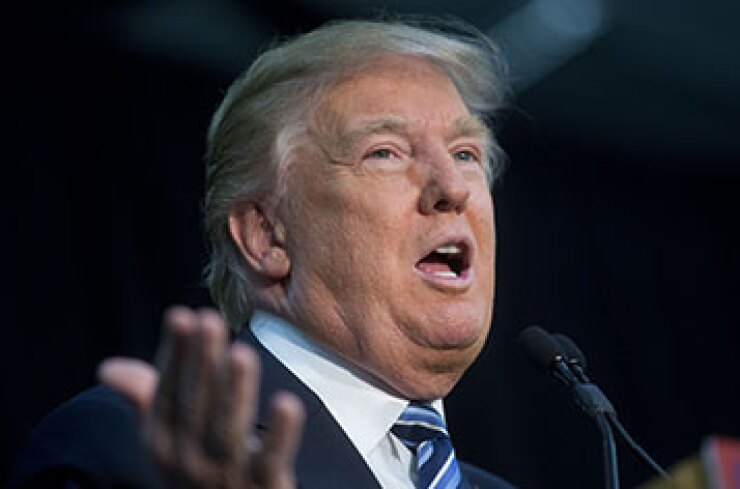(Bloomberg) -- President Donald Trump gave his blessing to a bipartisan health-care bill to pay the same insurance subsidies that the president said he’d halt last week, according to a Republican senator working on the package.
Last Thursday, Trump said he would stop making Obamacare’s “cost-sharing reduction” payments, which go to health insurers in the Affordable Care Act and help lower-income people afford co-payments and other cost-sharing, so that they can see a doctor or pick up a prescription.
Trump on Monday called the subsidies “a payoff, and it’s a disgrace.” Yet a key lawmaker said Monday that the president urged him to take legislative steps to pay them, with some changes. Republican Senator Lamar Alexander said Monday that he spoke with Trump about a bill that includes the subsidies, and got Trump’s blessing.
“He called me a week ago and he called me on Saturday,” Alexander said of the effort, which he’s working on with Democratic Senator Patty Murray . “We had a good conversation each time, and he encouraged me to get a result with Senator Murray. He said, ‘I don’t want people to suffer.’ That’s his words.”
Trump said Monday that creating a crisis was a necessary step to getting legislation moving.
“Republicans are meeting with Democrats because of what I did with the CSRs,” Trump said on Monday at a Cabinet meeting, referring to subsidies to insurers the administration said on Thursday it was cutting off. “If I didn’t cut the CSRs they wouldn’t be meeting, they’d be having lunch and enjoying themselves, all right. They’re right now having emergency meetings to have a short-term fix of health care.”

Little Certainty
Alexander’s efforts were just the latest chapter in a five-day period during which Trump ended the subsidies, bragged about pushing down health insurance stocks, then apparently backed paying the subsidies in a modified form. The moves have sown chaos among insurers, who are scheduled to begin selling 2018 plans to consumers in just more than two weeks, and have sharply raised premiums for next year because of the uncertainty in Washington.
Under the proposal, Alexander said, the payments would come with assurances they’re going to help people reduce their out-of-pocket costs, and not to insurance companies. Alexander said he’ll also push for more flexibility for states.
“We’re still talking,” Alexander said in Washington Monday. “The sooner the better. We want whatever agreement we have to benefit people in 2018 by holding down the increased premiums and by continuing to lower them in 2019.”
The administration said it announced a halt to the payments because they weren’t appropriated by Congress in the Affordable Care Act, and are thus illegal. The legal issue is the subject of a dispute now before the courts. But Trump’s former top strategist, Steve Bannon, said on Saturday that Trump ended the payments to sabotage the health law.
‘Serious Consequences’
Trump’s actions have brought together insurers, doctors, hospitals and business lobbyists, who on Saturday sent a letter to lawmakers asking them to make sure the cost-sharing payments are funded.
“There will be serious consequences without Congressional action: millions will face higher premiums, fewer choices, and less access to the medical care they need,” said the groups, including America’s Health Insurance Plans, the American Medical Association, the U.S. Chamber of Commerce, and the American Hospital Association.
But the short time before enrollment begins means the window for fixes for 2018 has likely closed. Insurers are increasing premiums in many states in part to offset the end of the payments, which compensate them for providing almost 6 million poor people with lower out-of-pocket costs.
Repeal Still On
Trump said he’ll still push for a full repeal of Barack Obama’s signature health law using the budget process known as reconciliation. The process allows Republicans in the Senate to pass bills with 51 votes, rather than 60, though it limits the scope of their action. He said that would probably take place in March or April.
He said the plan would likely include “block granting the money back to the states -- which does seem to make sense, the states running it, because it’s a smaller government that can be more individually sensitive.”
Nancy Pelosi, the Democratic leader in the House of Representatives, said Trump’s moves are bad for the working class.
“Hard-working families are suffering,” she said in a statement. “Democrats remain ready to work with Republicans to move quickly to stabilize the insurance marketplaces and lower costs for families. It is long past time for the President to stop the sabotage, and focus on bringing affordable, quality care to the American people.”





